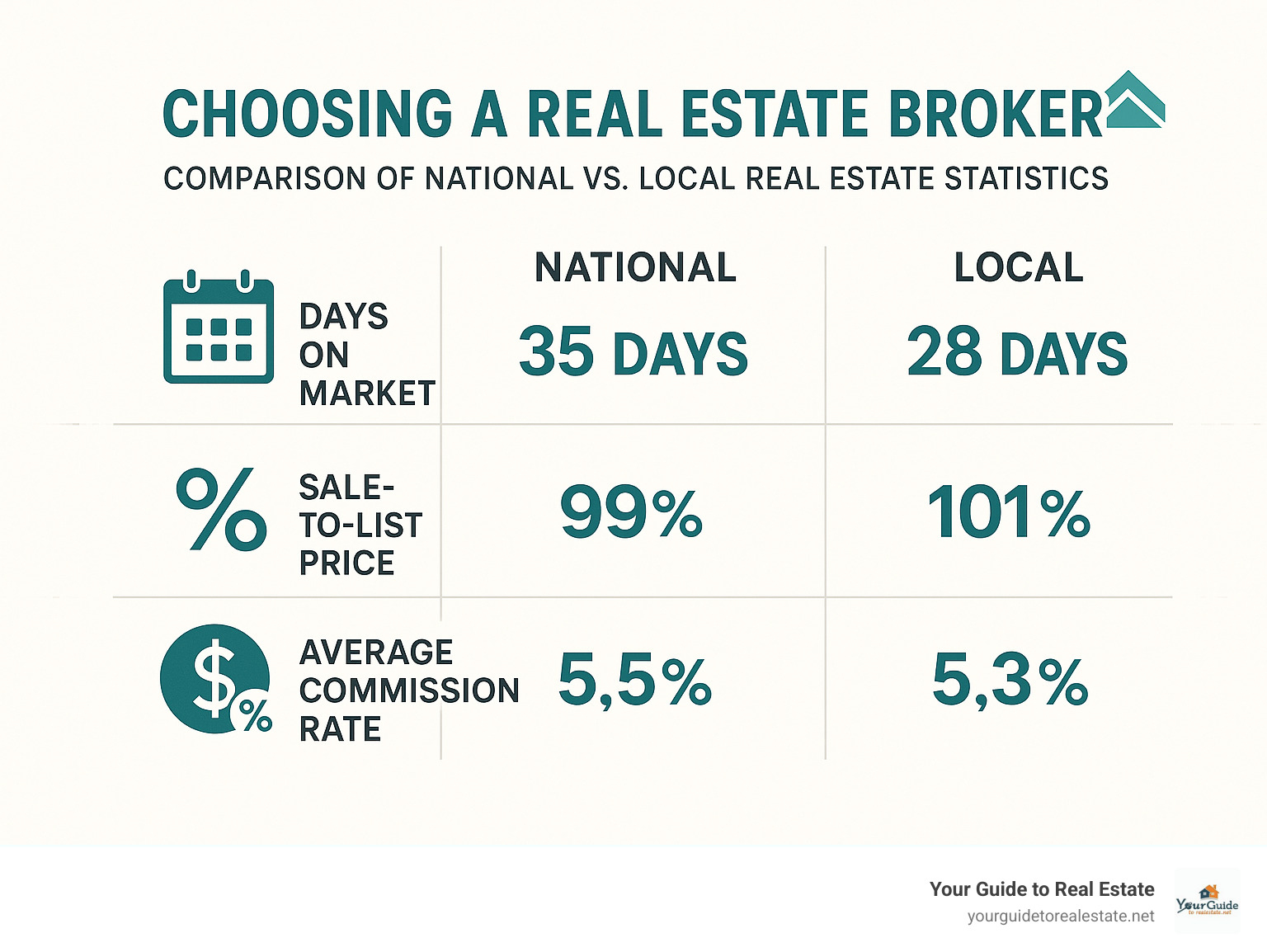Finding Your Perfect Real Estate Match
Choosing a real estate broker is one of the most critical decisions you’ll make during the home buying or selling process. To help you make this decision quickly:
| Key Steps to Choose a Real Estate Broker |
|---|
| 1. Verify credentials (license, experience) |
| 2. Ask for local market data and recent sales |
| 3. Interview at least 3 candidates |
| 4. Check references from past clients |
| 5. Discuss communication style and frequency |
| 6. Clarify commission structure and fees |
| 7. Ensure they represent your interests exclusively |
Approximately 86% of homeowners use a real estate agent or broker when buying or selling a home—and for good reason. The right broker can save you time, money, and countless headaches while navigating what’s likely the largest financial transaction of your life.
Many first-time homebuyers make the mistake of hiring the first agent they meet. In fact, studies show that 59% of sellers only contact one agent before listing their home. This approach could cost you thousands of dollars and lead to missed opportunities.
Think of broker selection like a job interview where you’re the employer. You need someone with the right mix of local expertise, negotiation skills, and communication style that matches your needs. Whether you’re buying your first home or selling an investment property, this guide will walk you through a proven framework for finding the perfect professional partner.
“Choosing the right real estate broker is like choosing a spouse, but harder,” as one industry veteran puts it. There’s no “Tinder for brokers,” so you need a systematic approach to find the right match.

Broker, Agent, Realtor: Know the Roles Before You Decide
Ever walked into a real estate office and wondered why some professionals have “broker” on their business cards while others say “agent” or “REALTOR®”? You’re not alone! These titles get tossed around interchangeably at dinner parties, but they actually represent different levels of expertise and responsibility.
Let’s explain these roles so you can make a more informed decision when choosing a real estate broker.
A Real Estate Agent is your entry-level professional. They’ve completed the basic state-required coursework (typically 40-90 hours depending on where you live) and passed their licensing exam. Think of them as the rookies of the real estate world – still learning, but fully licensed to help you buy or sell property. The catch? They can’t work independently and must hang their license with a supervising broker who oversees their work.
“I started as an agent and remember that exciting but scary feeling of helping my first clients,” shares Maria Chen, a veteran broker. “The supervision requirement exists to protect consumers while newer agents gain experience.”
A Real Estate Broker has climbed to the next level on the professional ladder. They’ve put in their time as an agent (usually 2-3 years), completed additional education (typically 100+ hours), and passed a more rigorous broker’s exam. This advanced training covers contract law, ethics, and business management in greater depth. Brokers can either work independently or open their own brokerage and hire agents to work under their license.
A REALTOR® isn’t actually a separate job title – it’s a professional membership designation. When an agent or broker joins the National Association of REALTORS® (NAR), which boasts over 1.5 million members nationwide, they earn the right to call themselves a REALTOR®. Members pledge to follow NAR’s Code of Ethics, which often goes beyond what state laws require.
| Professional | Education | Independence | Supervision Powers | Ethical Standards | Commission Structure |
|---|---|---|---|---|---|
| Real Estate Agent | Basic pre-licensing courses | Must work under a broker | Cannot supervise others | State regulations only | Splits with supervising broker |
| Real Estate Broker | Agent courses + additional broker education | Can work independently | Can supervise agents | State regulations only | Keeps full commission or splits with agents they supervise |
| REALTOR® | Same as agent or broker + ethics training | Depends on license type | Depends on license type | NAR Code of Ethics + state regulations | Varies based on agent/broker status |
An important consideration when choosing a real estate broker is understanding fiduciary duty. All licensed professionals owe their clients certain legal obligations, but how these duties are fulfilled can vary. Some states allow dual agency, where one agent represents both buyer and seller in a transaction – a practice that raises potential conflicts of interest.
“I always explain to my clients whether I’m working as a buyer’s agent or seller’s agent,” explains James Wilson, a broker with 15 years of experience. “The distinction affects whose interests I’m legally bound to prioritize throughout the transaction.”
Commission structures also differ between these professionals. Agents typically split their commission with their supervising broker (often 50/50 for beginners, improving as they gain experience). Brokers either keep their full commission when working directly with clients or take a percentage from the agents working under them.
When choosing a real estate broker, titles reflect different levels of experience and oversight. A broker with 20 years of experience might be perfect for a complex commercial transaction, while an enthusiastic agent who knows your target neighborhood inside and out could be ideal for your first home purchase.
The Bureau of Labor Statistics offers detailed research on real estate careers if you’d like to dive deeper into the professional requirements and industry outlook.
Understanding these distinctions gives you a solid foundation for the next step: developing a framework to find the perfect professional for your specific real estate needs.
Choosing a Real Estate Broker: A 7-Step Framework
With over 481,781 real estate establishments across the U.S. as of late 2022, finding your perfect match can feel like searching for a needle in a haystack. Don’t worry! I’ve developed a practical, step-by-step approach to make choosing a real estate broker much less overwhelming.
Step 1: Clarify Your Goals and Representation Needs
Before diving into broker interviews, take a moment to get crystal clear on what you actually need:
Are you buying? You’ll want a dedicated buyer’s agent who excels at property hunting, offer negotiations, and guiding you through inspections to closing day.
Selling instead? Look for a listing agent with marketing prowess, pricing expertise, and strong negotiation skills to maximize your return.
“Know whether you want someone representing only your side of the transaction,” advises real estate expert Victoria Vinokur. “Avoid dual agents who represent both buyer and seller simultaneously—this creates natural conflicts of interest that rarely work in your favor.”
Also consider whether you need a specialist. Some brokers focus exclusively on condos, others on luxury properties or investment opportunities. Match their expertise to your specific situation.
Step 2: Gather Names via Referrals, Open Houses & Directories
Now that you know what you’re looking for, it’s time to create your candidate list:
Start with personal connections—friends, family, and colleagues who’ve recently bought or sold property often provide the most honest feedback about their experiences.
Don’t overlook professional networks! Home inspectors typically know which agents truly prioritize client interests. As one happy homebuyer shared, “I contacted a trusted home inspector who recommended agents known for their thoroughness and client advocacy.”
Visiting open houses in your target neighborhood lets you observe brokers in action without any pressure. Pay attention to how they interact with visitors and their knowledge of the local market.
Finally, explore online resources like the National Association of REALTORS® database to round out your list of 5-7 potential candidates.
Step 3: Shortlist & Research – Choosing a Real Estate Broker Starts Online

Time to narrow down your list through strategic online research:
First, verify each candidate’s license status through your state’s real estate commission website. This crucial step also reveals any disciplinary actions you should know about before proceeding.
Next, dive into online reviews. Look beyond simple star ratings to understand the detailed experiences others have had. Pay special attention to how brokers respond to negative reviews—their reaction often reveals more about their character than the complaint itself.
Evaluate their digital presence. In today’s market, a broker’s website and social media profiles showcase their marketing abilities. If they can’t effectively market themselves online, they might struggle to market your property too.
Finally, examine their recent sales history in your target area and price range. As one industry veteran notes, “An agent’s track record in your specific market is far more valuable than their total years in real estate.”
Use this research to identify your top three candidates who best align with your needs.
Step 4: Interview at Least Three Candidates
Here’s a shocking statistic: 59% of sellers contact only one agent before listing their home. Don’t make this costly mistake!
Treat these interviews like you’re hiring for an important position—because you are. Come prepared with consistent questions for each candidate:
How long have they worked in real estate, especially in your specific neighborhood? What’s their typical client load? Do they work solo or with a team? How frequently will they communicate, and through which channels? Ask for specific examples of challenging negotiations they’ve handled successfully.
Pay close attention to their listening skills. A great broker should spend as much time asking about your needs as they do talking about their qualifications.
“A tough negotiator can cost you the house; a smart negotiator who understands loan concessions and contract contingencies is better,” explains one experienced broker. Look for someone who negotiates strategically, not just aggressively.
Step 5: Verify Local Market Performance Data
When choosing a real estate broker, proven results in your target market matter enormously. Request specific performance data from each candidate:
How do their listings’ days-on-market compare to local averages? What’s their typical sale-to-list price ratio? Can they show you recent comparable sales from the past 3-6 months in your neighborhood?
One homeowner shared this revealing experience: “When I asked for comparable sales data, one agent showed me properties from a year ago, while another had detailed information about sales from the past three months. The difference in market knowledge was striking.”

Step 6: Compare Commission Structures & Hidden Fees
While 5-6% is the standard commission rate (typically split between listing and buyer’s agents), remember these rates are negotiable.
If you’re selling, clarify exactly what the commission includes. Are professional photography, staging consultations, and marketing costs covered? Are there additional transaction fees hiding in the fine print?
For buyers, while you typically don’t pay commission directly (sellers usually cover this), understand whether your agent offers buyer rebates, if there are cancellation penalties, and what happens if you don’t find a home within your agreed timeframe.
“A higher commission split doesn’t always mean better service,” notes one industry professional. “Sometimes brokers with slightly lower rates offer more comprehensive marketing packages or better service guarantees.”
Step 7: Review Contracts, Cancellation Clauses & Sign Confidently
Before signing any agreement, carefully review the fine print:
For sellers, examine the listing agreement’s duration (3-6 months is typical), whether it’s exclusive right to sell or exclusive agency, any marketing commitments from the broker, and most importantly—the cancellation terms and penalties.
Buyers should review their buyer-broker agreement for duration and geographic limitations, exclusivity requirements, compensation structure, and termination clauses.
“Don’t sign an exclusive agreement with the first broker you meet,” cautions a real estate consultant. “Make sure you have a clear exit strategy if the relationship isn’t working out.”
When you’ve completed all seven steps, you’ll be ready to make a confident choice backed by thorough research rather than just gut feeling. For more detailed guidance on selecting the perfect agent, check out our complete buyer’s guide to choosing the right real estate agent.
15 Must-Ask Questions Before Committing
Looking for the right real estate partner is a bit like dating – you need to ask the right questions before making things official. These fifteen questions will help you find a broker who’s truly compatible with your needs:
What experience do you have with my specific situation? Whether you’re a first-time buyer, luxury seller, or investor, you need someone who understands your unique circumstances. Don’t settle for generic experience – dig deeper into their history with situations similar to yours.
Can you walk me through your detailed marketing plan? For sellers, this is crucial. A good broker should confidently outline their strategy including professional photography, virtual tours, social media promotion, and broker open houses. The numbers don’t lie – 69% of sellers report their agent actively helped promote their home and connect with potential buyers.
How will we stay in touch throughout the process? Communication breakdowns cause most client-broker frustrations. As one real estate attorney I spoke with pointed out, “Texting is inappropriate for legal-related communications; insist on written reports for key updates.” Establish your preferences upfront – whether that’s daily texts, weekly calls, or regular email updates.
How many clients are you juggling right now? This gives you insight into how much personal attention you can expect. A broker with 30 active clients will likely have less time for you than one with 8-10.
What technology do you use to make the process smoother? In today’s digital market, tech-savvy brokers have a clear advantage. Recent statistics show more than 95% of buyers search for homes online, and remarkably, 49% of buyers made offers after only seeing virtual tours. Your broker should be comfortable with the tools modern buyers and sellers use.
May I speak with some of your recent clients with needs like mine? Then actually make those calls! Past clients will give you the unfiltered truth about working with this broker.
Who covers for you when you’re unavailable? Life happens – vacations, illnesses, family emergencies. Make sure there’s a solid backup plan so your transaction doesn’t stall when your broker is temporarily unavailable.
Do you practice dual agency? This is a big one. Ideally, your broker should represent only your interests. Dual agency (representing both sides) creates inherent conflicts of interest.
What’s your complete commission structure, and are there any additional fees? Get all financial details in writing to avoid surprises later. While standard rates exist, everything is negotiable.
How well-connected are you with other professionals I’ll need? A great broker has built relationships with trustworthy mortgage brokers, inspectors, attorneys, and contractors. These connections can save you time and headaches.
What’s your negotiation philosophy? Ask for specific examples of successful negotiations they’ve handled. Their answer reveals a lot about their approach to protecting your interests.
How many transactions did you close last year, and at what price points? This indicates both their activity level and whether they have relevant experience in your price range.
What makes you different from other brokers in the area? Listen for concrete advantages beyond marketing speak. What specific value do they bring that others don’t?
Is real estate your full-time career? Part-time agents may have limited availability when you need them most. Choosing a real estate broker who’s fully committed to the profession typically means better service.
What hasn’t worked well for your past clients, and how did you address it? This question tests both their honesty and problem-solving abilities. Everyone makes mistakes – what matters is how they handle them.
Why Choosing a Real Estate Broker Who Knows Your Neighborhood Matters
When choosing a real estate broker, local expertise isn’t just a nice bonus – it’s essential. A neighborhood specialist brings advantages that can significantly impact your transaction:
They understand micro-market pricing trends that broader data might miss. For example, they’ll know why homes on one street command $15,000 more than seemingly identical properties just two blocks away.
They often have the inside track on properties before they officially hit the market. One homeowner I interviewed found her dream home because her broker knew about a coming listing through neighborhood connections – she made an offer before the property went public.
Their community connections prove invaluable in unexpected ways. As one homebuyer shared, “Our broker knew the local school principal and got us detailed information about programs that weren’t on the school’s website.” These insights helped them make a more informed decision about which neighborhood would best serve their children’s needs.
They understand zoning and development plans that might affect future property values. Knowing about that planned shopping center or highway expansion before you buy can save you from unpleasant surprises later.
Look for brokers who demonstrate genuine community involvement through local organizations, businesses, or charities. This participation signals a deeper commitment to the area and typically translates to better market insights for you.
Why Choosing a Real Estate Broker Who Avoids Dual Agency Matters
When choosing a real estate broker, understanding representation is critical. Dual agency – where one broker represents both buyer and seller in the same transaction – creates inherent conflicts of interest that can hurt you financially.
Here’s why exclusive representation matters:
Your broker should be 100% in your corner. With dual agency, they’re trying to serve two masters with opposing goals. As one real estate attorney explained to me, “A dual agent is like a referee who’s also playing for both teams. It’s inherently problematic.”
Confidentiality becomes impossible. In a dual agency situation, the broker cannot keep your maximum budget (as a buyer) or minimum acceptable price (as a seller) truly confidential from the other party. This significantly weakens your negotiating position.
A real-world example makes this clear: A buyer told their broker they could increase their offer by $10,000 if necessary. Because the broker was also representing the seller, that information was immediately shared with the seller – who then held firm on the higher price rather than accepting the buyer’s initial offer.
Negotiation power is compromised. How can someone aggressively negotiate on your behalf while simultaneously trying to get the best deal for the other party? They simply can’t.
Always ask for written disclosure of who the broker represents, and whenever possible, work with someone who represents only your interests. The small commission savings that might come with dual agency rarely outweigh the financial disadvantages of compromised representation.
Comparing Brokerages for New Agents: Culture, Commission, Support
Fresh out of real estate school with your new license in hand? Choosing a real estate broker as a new agent requires a completely different approach than what buyers and sellers consider. Your first brokerage will shape your entire career trajectory.
I’ve seen too many new agents make the same critical mistake – focusing solely on commission splits when selecting their first brokerage. As one seasoned brokerage manager told me recently, “Many new agents base their decision on commission split, and that usually isn’t the best route. A 100% split of nothing is NOTHING! Look for quality training and mentorship instead.”
When evaluating potential brokerages, think beyond the immediate paycheck. The training, support, and mentorship you receive in your first year or two will determine whether you thrive or merely survive in this competitive industry. A slightly lower commission now could mean significantly higher earnings later if you’re learning from the right people.
Speaking of commission structures, make sure you understand all the financial aspects before signing on. Most brokerages offer splits ranging from 50/50 to 100%, but that’s just the beginning of the story. Ask about desk fees, monthly costs, transaction fees, and commission caps (the maximum amount you’ll pay to the broker annually). If you’re considering a franchise, don’t forget about those additional franchise fees – typically 3-8% on top of your regular split.
Technology and marketing support can make or break your early success. In my conversations with new agents, those with robust tech platforms consistently outperform those left to figure things out alone. Look for brokerages that provide comprehensive CRM systems, marketing automation tools, virtual tour software, and genuine website/social media support – not just promises of these resources.
Office culture deserves more attention than most new agents give it. As one experienced agent colorfully put it, “Big-brand brokerages can feel like a pack of wolves despite touting a ‘family’ culture.” Don’t just take the broker’s word for it – visit the office, observe how agents interact with each other, and if possible, ask to sit in on a team meeting. The energy and atmosphere will tell you more than any recruiting pitch.
Lead generation might seem like a secondary concern now, but it will quickly become your primary focus. Understand exactly how leads are distributed at the brokerage. Are they given to top producers first? Is there a rotation system? Do you have to pay additional fees to access brokerage-generated leads? These questions matter tremendously.
Finally, consider management accessibility. “The ratio of agents to managers matters,” as one real estate coach explained to me. “You want timely support when deals get complicated.” In your first year, you’ll have countless questions and situations where you need guidance. If your broker is overseeing 100+ agents, will they have time for you when you need them most?

Boutique vs Franchise Brokerage: Which Fits Your Career?
One of the biggest decisions you’ll face as a new agent is whether to join a recognizable national franchise or a smaller boutique firm. This choice depends largely on your personality, learning style, and long-term goals.
Franchise brokerages come with instant name recognition – that familiar yard sign that consumers already know and trust. They typically offer structured training programs that walk you through every aspect of the business, extensive agent networks for referrals, and standardized systems that have been refined over decades. If you prefer clear guidelines and established processes, a franchise might be your ideal starting point.
Boutique brokerages, on the other hand, often shine in different ways. They typically offer more flexible marketing approaches, higher commission splits (since they don’t have franchise fees to pay), more personalized mentoring, and frequently a stronger focus on specific local markets or niches. If you’re entrepreneurial and value creative freedom, a boutique firm might better match your style.
I’ve heard countless perspectives from agents who’ve worked in both environments. One independent broker summed it up perfectly: “Boutique firms value each agent’s success more because they can’t rely on mass recruitment. But national brands can offer resources and referral networks that smaller firms can’t match.”
Your decision ultimately comes down to what you value most in these early career stages – structure and resources, or flexibility and personalized attention.

Tech & Tools Checklist Every Modern Brokerage Should Provide
In today’s real estate landscape, technology isn’t just a nice-to-have – it’s essential for survival. When interviewing potential brokerages, pay close attention to their tech stack. The right tools can dramatically accelerate your learning curve and productivity.
At minimum, your brokerage should provide a comprehensive CRM system that helps you track clients and transactions without missing critical follow-ups. With nearly half of all buyers now making offers after virtual tours, virtual tour technology isn’t optional anymore – it’s a fundamental marketing tool.
The most forward-thinking brokerages now offer AI-powered analytics for pricing recommendations and market insights that were once available only to seasoned agents. These tools can help you appear far more knowledgeable than your actual experience level.
Other tech essentials include real-time MLS feeds that notify you immediately when new listings hit the market, digital transaction management systems for paperless contract handling, social media integration for seamless marketing campaigns, and effective lead generation systems that provide a consistent pipeline of potential clients.
As one digital marketing specialist in real estate emphasized during our conversation, “A tech-savvy brokerage is essential in today’s real estate market. The right tools can double your productivity and transaction volume.” When comparing brokerages, don’t just ask if they have these tools – ask for demonstrations and talk to current agents about how effectively the brokerage supports and trains agents on using them.
The brokerage you choose will be your professional home and shape your earliest impressions of the industry. Take your time, ask thorough questions, and choose the environment where you’ll be most supported in building the foundation of your real estate career. For more detailed guidance on selecting the right brokerage as a new agent, check out our comprehensive guide to brokerage selection.
Frequently Asked Questions about Choosing a Real Estate Broker
Let’s tackle some of the most common questions I hear from folks starting their broker search. These answers might save you some time and confusion as you steer the process!
Is a real estate broker the same as a Realtor?
This is probably the most frequent mix-up I see. The short answer is no, they’re not the same thing.
A real estate broker has invested in additional education beyond the agent level (typically 100+ hours of coursework) and passed a more rigorous exam. This advanced credential allows them to work independently and even supervise other agents.
A Realtor, on the other hand, is someone who’s joined the National Association of Realtors and committed to following their Code of Ethics. This code often sets higher standards than what state laws require.
The interesting part? A person can be both a broker and a Realtor simultaneously, just one of these, or neither! It all depends on their education, licensing, and professional memberships.
Can I negotiate the broker’s commission?
Absolutely! Despite what some might tell you, commission rates aren’t set in stone. While the standard hovers around 5-6% of the sale price, there’s usually room for discussion based on several factors:
- Property value – Higher-priced homes sometimes qualify for lower percentage rates since the dollar amount is still substantial
- Market conditions – In competitive markets, brokers might show more flexibility
- Service package – Full-service versus limited-service arrangements naturally affect pricing
- Your relationship – Repeat clients or those with multiple transactions might receive preferential rates
As one of my favorite real estate consultants puts it, “Everything in real estate is negotiable, including the broker’s commission. Just be sure you understand what services might be reduced if you negotiate a lower rate.”
Think of it like any service negotiation – be respectful, do your homework on typical rates in your area, and understand what you’re getting for your money.
How many clients are too many for one broker?
This is such a smart question! While there’s no perfect number that applies to everyone, there are definitely warning signs that your broker might be spread too thin:
- You regularly wait more than 24 hours for responses to important communications
- You find yourself mainly dealing with assistants rather than the broker you hired
- The broker seems constantly unavailable for showings or meetings
- They mix up details about your situation or seem confused about your needs
When interviewing potential brokers, I recommend asking directly: “How many active clients do you typically work with, and how do you ensure each receives adequate attention?”
A good answer will reveal their system for managing workload and prioritizing client needs. Some highly organized brokers can effectively juggle 10-15 clients, while others might struggle with half that number. What matters most is whether they have the capacity to give your transaction the attention it deserves during critical periods.
Choosing a real estate broker who’s the right fit for your specific situation is worth taking the time to research thoroughly. The right professional partnership can make all the difference in your real estate journey.
Conclusion

The journey of choosing a real estate broker might seem daunting at first, but it’s one that pays tremendous dividends when done thoughtfully. Think about it—this person will guide you through what’s likely the biggest financial transaction of your life. Worth taking your time to get it right, wouldn’t you say?
I’ve seen how following our 7-step framework transforms the broker selection process from overwhelming to empowering. One client told me, “I interviewed three brokers instead of going with the first referral, and it saved me $15,000 on my home purchase because of my broker’s superior negotiation strategy.” Stories like this aren’t rare—they’re the natural outcome of doing your homework.
The steps we’ve covered aren’t just theoretical—they’re practical tools that thousands have used successfully. Verify those credentials and make sure they have real experience in your neighborhood. Don’t skip the interview stage—those face-to-face conversations reveal so much more than a website ever could. And please, check those references! Past clients will tell you the unvarnished truth about working with a particular broker.
Understanding the fee structure upfront prevents those awkward “I didn’t know I had to pay for that” moments later. And clear communication expectations? Absolutely vital. You deserve to know how and when your broker will keep you informed throughout the process.
Before signing any contract, read it carefully. Those cancellation clauses matter—especially if things don’t work out as planned. You’re not just hiring a broker; you’re building a partnership that should feel right from day one.
At YourGuideToRealEstate.net, we’re passionate about helping you steer these important decisions with confidence. We understand that real estate isn’t just about properties—it’s about people and their dreams. Whether you’re buying your first home, selling a beloved family property, or launching an exciting real estate career, having the right broker by your side makes all the difference.
The perfect broker for your unique situation is out there. They’re waiting to help you achieve your real estate goals, and with the insights from this guide, you’re now equipped to find them. Trust your instincts, follow the framework, and accept the journey—success awaits!
For more in-depth information about real estate agent skills or other aspects of the buying and selling process, our website offers a wealth of resources to support you every step of the way.





















